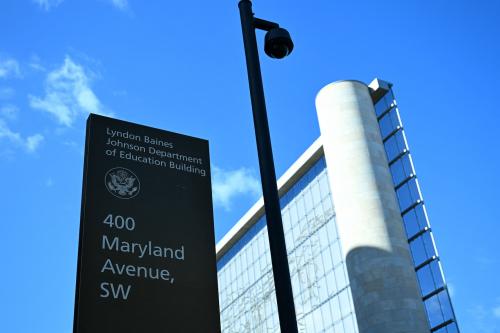In 1971 a friend asked me to accompany her to a District of Columbia school board meeting. “It’s so much fun,” she explained, “that we can take popcorn and watch the entertainment.” I was reminded of her invitation a few days ago when I read about the current school board stripping its elected president, Wilma Harvey, of her office. It seems like the old days, when the school board provided the best show in town as it fought with its superintendent and each other over everything except the education of the children under their charge.
I was a member of the D.C. control board that stripped the school board of its power and installed a five-member appointed board. Our expectation was that the elected board could learn how to work together with fewer responsibilities and they could return to power in June 2000. Meanwhile the appointed board and the superintendent could start to rebuild a woefully inadequate system.
Now I do not feel that the elected board should have its power restored. Although there have been many accomplishments by the appointed board—adoption of accountability standards for teachers and administrators, repair of buildings, teacher recruitment and training, adoption of school-based budgeting, starting an extensive summer program and the hiring of a very able superintendent—the elected board has not lived up to its end of the bargain.
First, the board was given the responsibility of oversight for charter schools. There is little evidence that the board has demonstrated competence in this significantly reduced role. One has only to turn to the way the school board mishandled the Marcus Garvey Charter School problems to see that it has not done a very good job in this oversight role.
The board was also expected to go through a rigorous training process on how to conduct oversight in a policy-making role and how to avoid meddling in the day-to-day operations of the schools. The latter was critical because most of the conflicts in the past have resulted from the interference of board members in the operations of the superintendent’s office and the schools in their wards. The school board has also failed the test in this regard.
Although an excellent transition plan was crafted, spearheaded by control board member Constance Newman and consultant Mary Futtrell, former president of the National Education Association and current dean of the School of Education at George Washington University, there is no evidence that the board ever gave serious consideration to adhering to the tasks laid out in the plan in order to get its power back. In fact, one of the alleged reasons for stripping Wilma Harvey of her power was that she cooperated in the drafting of the plan without informing or involving her fellow members. I don’t know if the opposition members objected to her cooperation or if they objected to the plan itself. This latest controversy is further evidence that most of their time has been and still is devoted to squabbling among themselves.
None of us should expect the current superintendent, Arlene Ackerman, to work under such an incompetent board. The appointed trustees provided a buffer between the superintendent and the elected board and allowed the administration to accomplish a lot. However, if the power is turned back to this board, I would be the first to understand why not only Ackerman but other competent candidates would refuse to work in such a chaotic system.
Meanwhile, we will see a lot of posturing and hear criticism about why the control board should not have taken over the schools. Yet few of the critics will be able to say that things haven’t improved. What Washingtonians continue to see in this controversy is a struggle for power and control of the apparatus, and not very much about how to race to rebuild the school system to teach a majority poor African American student population to function in a very competitive society. That is the bottom line.
Little progress has been made since my friend invited me to eat popcorn with her and be entertained by the bickering school board. It is time that we citizens consider whether an elected board is in the long-term best interests of the children. Other cities have recognized that the issue is not who holds the power but who intends to put the education of the children first. Boston, Chicago, Cleveland and Detroit now have appointed boards, and I predict that more cities will turn to this governance structure to keep petty politics out of the rebuilding of archaic school systems.
I propose that we consider the option of an appointed board that is subjected to a confirmation process. Other options should also be put on the table. But clearly, something needs to be done if we care at all about the children of our city.
The Brookings Institution is committed to quality, independence, and impact.
We are supported by a diverse array of funders. In line with our values and policies, each Brookings publication represents the sole views of its author(s).



Commentary
Op-edAn ‘F’ for the School Board
July 27, 1999